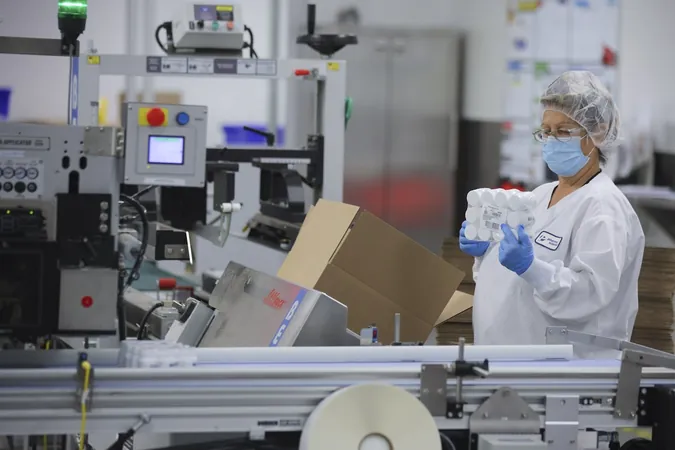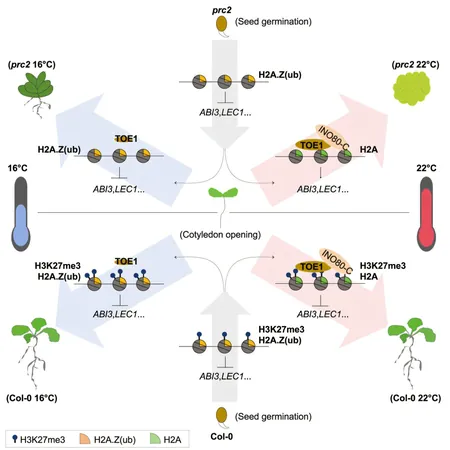
Tariff Tensions: The U.S. Targets Drug Imports, Threatening Supply Chains
2025-04-15
Author: Michael
Pharmaceutical Supply Chain Under Siege
In a bold move that could shake the foundations of the pharmaceutical industry, the White House has initiated a national-security probe into the U.S. pharmaceutical supply chain. This investigation could lead to hefty tariffs, impacting billions of dollars in Canadian exports of critical medical ingredients.
A New Phase of Protectionism
On Monday, the U.S. Department of Commerce announced it will scrutinize imports of pharmaceuticals and their components, adding this sector to the growing list of industries targeted by the Trump administration's aggressive trade policies. Pharmaceuticals rank high among U.S. imports alongside automobiles and electronics, all now facing potential tariffs.
Investigation Scope Expands
This latest inquiry comes at a time when the U.S. is also investigating its reliance on foreign semiconductor imports. The inclusion of pharmaceutical ingredients means that the over $7 billion worth of Canadian pharmaceutical exports could be subject to tariffs, not just the already estimated $3 billion in finished drug products.
Generics at Greater Risk
Canada is home to major generic drug manufacturers like Apotex and Pharmascience, and these generics constitute more than 90% of prescriptions dispensed in the U.S. The looming tariffs could hit these crucial products hard, destabilizing the market.
Trump's Vision: On-Shoring Drug Production
President Trump has suggested that tariffs could incentivize domestic drug manufacturing. Currently, a significant portion of U.S. drug imports comes from countries like China and India, with India alone producing 50% of the active pharmaceutical ingredients used in American-made drugs.
Challenges of Moving Production
Experts caution that relocating the entire pharmaceutical supply chain to the U.S. is virtually impossible. Mina Tadrous, a research chair in pharmaceutical policy at the University of Toronto, notes that the complexity of drug manufacturing involves around 3,000 active ingredients across 15,000 unique products, each with separate supply chains.
Potential Consequences of Tariffs
Imposing tariffs could lead to significant supply chain disruptions, endangering access to essential medications. A recent study highlighted that essential drugs, including antibiotics and antidepressants, could face shortages due to these potential tariffs.
Safety Versus Security
Terry Creighton from the Canadian Pharmaceutical Manufacturers and Exporters Alliance argues that historically, medicines have been exempt from tariffs due to public health concerns. Her organization has appealed to U.S. trade authorities, advocating that Canada, as a reliable supplier, poses a lesser risk to U.S. national security than other nations.
The Technology Sector on Edge
Pharmaceuticals and semiconductor chips have been shielded from tariffs until now, but U.S. Commerce Secretary Howard Lutnick hinted that changes may be on the horizon. With a majority of advanced chips manufactured overseas, companies like Tesla and Nvidia may face increased costs which will likely trickle down to consumers.
Canada’s Strategic Position
While some chips enter the U.S. from Canada—IBM Canada, for instance, assembles chips for export—Canada mostly relies on imports. This imbalance raises the stakes, as retaliatory tariffs could backfire on Canadian businesses.
The unfolding tariff landscape presents a balancing act between national security and the health and wellbeing of the public, leaving both industries and consumers anxiously awaiting what comes next.









 Brasil (PT)
Brasil (PT)
 Canada (EN)
Canada (EN)
 Chile (ES)
Chile (ES)
 Česko (CS)
Česko (CS)
 대한민국 (KO)
대한민국 (KO)
 España (ES)
España (ES)
 France (FR)
France (FR)
 Hong Kong (EN)
Hong Kong (EN)
 Italia (IT)
Italia (IT)
 日本 (JA)
日本 (JA)
 Magyarország (HU)
Magyarország (HU)
 Norge (NO)
Norge (NO)
 Polska (PL)
Polska (PL)
 Schweiz (DE)
Schweiz (DE)
 Singapore (EN)
Singapore (EN)
 Sverige (SV)
Sverige (SV)
 Suomi (FI)
Suomi (FI)
 Türkiye (TR)
Türkiye (TR)
 الإمارات العربية المتحدة (AR)
الإمارات العربية المتحدة (AR)